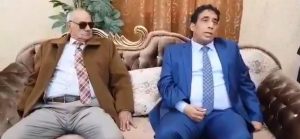By Sami Zaptia.

London, 12 February 2021:
Speaking at his arrival in his hometown of Tobruk Friday, new Presidency Council head, Mohamed Menfi (Manfi/Menefi) said there were three main aims of his term in office.
He conceded that he had ‘‘a difficult job’’ on his hand and Libya was ‘‘in a difficult stage’’, but that Libyans ‘‘chose dialogue’’ until they ‘‘reach the 24 December elections’’.
He said his main three policy pillars are:
- Firstly, the unification of the army through the existing UNSMIL 5+5 Joint Military Commission track which he said he ‘‘will support until we unify the army’’.
- Secondly, the unification of institutions. He said in a way this was the most important policy as it improves people’s standards of living in short term. This leads to stability and therefore people can vote in elections. There can be no elections without security and without good standard of living for people to pay attention to elections. Security would be achieved either through the Interior Ministry or the army.
- Thirdly, reconciliation. He said that he had started the study of numerous proposals on this.
Ultimately, he said that all this involves collective work and that no one person can do it alone.
Menfi had arrived in Tobruk after first arriving from Athens (where had been Libya’s ambassador) to Benghazi yesterday and meeting Libyan National Army (LNA) Commander, Khalifa Hafter.
His arrival in Libya yesterday was his first since he was selected by the 74 member Libyan Political Dialogue Forum (LPDF) in Geneva last Friday 5 February.
The LPDF membership was selected by UNSMIL to represent all of Libya. This comes after the country’s parliament, the House of Representatives (HoR), has been in a state of political paralysis since 2014, unable to implement its constitutional duty of passing the draft constitution and conducting constitutionally based general elections to take the country out of its interim state.
Menfi chose to meet Hafter and then visited Benghazi University where he met various dignitaries, academics and NGOs – but failed, publicly at least, to meet with HoR head, Ageela Saleh.







